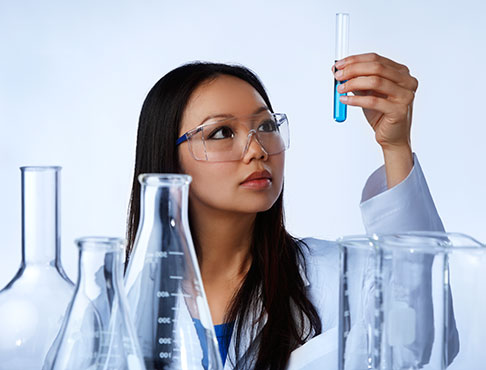So you wanna be a Medical Laboratory Technologist
by StudyMalaysia.com on August 19, 2015 | Top Stories
The job of a medical laboratory technologist
As a medical laboratory technologist, you examine blood and other body fluids to search for clues in the diagnosis of various diseases. These tests help determine the presence, extent, or absence of disease. It also helps doctors monitor the effectiveness of a particular treatment.
Some of the functions you may carry out include microscopic examination and analysis of blood, body fluids, tissues and cells; identification of bacteria, parasites and other microorganisms; cross match blood for transfusion; and perform differential cell counts. You will also need to follow standardised operating procedures, and carry out quality assurance measures to ensure the accuracy of test results.

Is this job for you?
You might enjoy the job of a medical laboratory technologist if you like solving problems and enjoy challenges and puzzles. You should also consider this job if you are good at attention to detail, organising information and critical thinking.
The interest code for this career is IRC (Investigative, Realistic and Conventional):
Investigative — Investigative occupations frequently involve working with ideas, and require an extensive amount of thinking. These occupations can involve searching for facts and figuring out problems mentally.
Realistic — Realistic occupations frequently involve work activities that include practical, hands-on problems and solutions. They often deal with plants, animals, and real-world materials like wood, tools, and machinery. Many of the occupations require working outside, and do not involve a lot of paperwork or working closely with others.
Conventional — Conventional occupations frequently involve following set procedures and routines. These occupations can include working with data and details more than with ideas. Usually there is a clear line of authority to follow.
Work styles
As a medical laboratory technologist, you must be comfortable with technology and be able to understand how to operate complex machinery. It is important that you are able to follow exact instructions from physicians in order to perform correct tests or procedures.
Manual dexterity is essential as medical laboratory technologists need to be skilful with their hands – working with needles and precise laboratory instruments effectively is part of the job. It is common for medical laboratory technologists to work on their feet for long periods while collecting samples.
Work values
Medical laboratory technologists value a workplace that has a supportive management who stands behind its employees; they like being able to work and make decisions on their own. They also value achievement as they are results oriented.
Work environment
Most medical laboratory technologists work full time and some may be required to work shifts and at weekends. Depending on the specimens and materials they deal with, they need to wear protective gear for their safety and protection. This may include lab coats, masks, gloves and goggles.
Their job requires using sophisticated equipment and instruments which can perform a number of tests simultaneously, and following procedures at all times. Some technologists work only in laboratories while others may have direct contact with patients when collecting specimen samples.
Places of employment
Medical laboratory technologists work at government and private hospitals. They can also gain employment at medical and diagnostic laboratories, offices of private practice, and colleges or universities.
Job entry requirement
An entry-level job for technologists usually requires a bachelor’s degree in medical technology or life sciences. A diploma qualification is accepted for positions of medical laboratory technician. With experience and on-the-job training, some technologists may move on to a specialisation such as immunology, histotechnology, cytotechnology or clinical chemistry.
Education and training qualifications:
Bachelor Degree Programmes
Diploma Programmes
Take a peek at what a Medical Laboratory Technologist does in this video.
This video tells us more about being a medical laboratory technologist and how it’s different from being a medical laboratory technician.
Reference:
Mayo Clinic, Medical Laboratory Sciences,
Occupational Outlook Handbook,
My Next Move
You May Also Be Interested In...
Help! I don't know which pre-U programme to pick
![Help! I don't know which pre-U programme to pick - StudyMalaysia.com]() If you've shortlisted a few pre-U options but still don't kn...
If you've shortlisted a few pre-U options but still don't kn...Education Fair for Foundation Studies
![Education Fair for Foundation Studies - StudyMalaysia.com]() All SPM school leavers are invited to visit FOUNDATION EDUCATION FAIR ...
All SPM school leavers are invited to visit FOUNDATION EDUCATION FAIR ...Universities that produce the most employable graduates – a 2020 report
![Universities that produce the most employable graduates – a 2020 report - StudyMalaysia.com]() Do you think employers favour graduates from certain universities? Hav...
Do you think employers favour graduates from certain universities? Hav...Scholarships with March & April 2018 Deadlines
![Scholarships with March & April 2018 Deadlines - StudyMalaysia.com]() Attention school leavers! Applying for scholarships? Check this list f...
Attention school leavers! Applying for scholarships? Check this list f...Discovering study modes for a bachelor degree (home-grown and foreign degree)
![Discovering study modes for a bachelor degree (home-grown and foreign degree) - StudyMalaysia.com]() Both public and private higher educational institutions offer bachelor...
Both public and private higher educational institutions offer bachelor...�Elevating Eye Care with a UCSI Optometry Degree
![�Elevating Eye Care with a UCSI Optometry Degree - StudyMalaysia.com]() It is a little known fact that the eyes provide clues to a person'...
It is a little known fact that the eyes provide clues to a person'...































